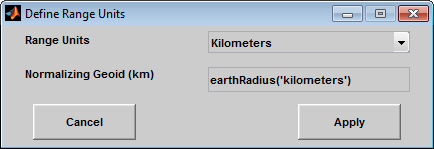trackui
(Removed) GUI to display great circles and rhumb lines on
axesm-based map
The trackui function has been removed. Use the trackg function instead.
Activation
trackui
trackui(h)
Description
trackui activates the Define Tracks dialog box for adding great
circle or rhumb line tracks to the current axesm-based map.
trackui(h) activates the Define Tracks dialog box for adding
great circle or rhumb line tracks to the axesm-based map specified
by the axes handle h.
Controls
Define Tracks dialog box for two-point mode

The Style selection buttons are used to specify whether a great circle or rhumb line track is displayed.
The Mode selection buttons are used to specify whether one point or two points are to be used in defining the track. If one-point mode is selected, a starting point, azimuth, and range are the required inputs. If two-point mode is selected, starting and ending points are required.
The Starting Point controls are used for both one-point and two-point mode. The Lat and Lon edit boxes are used to enter the latitude and longitude of the starting point of the track to be displayed. These values must be in degrees. To display more than one track, a vector of values can be entered, enclosed in brackets in each edit box. Pushing the Lat or Lon button brings up an expanded edit box for easier entry of long vectors. The Mouse Select button is used to select a starting point by clicking the displayed map. The coordinates of the selected point then appear in the Lat and Lon edit boxes and can be modified. The coordinates appear in degrees, regardless of the angle units defined for the current map projection.
The Ending Point controls are used only for two-point mode. The Lat and Lon edit boxes are used to enter the latitude and longitude of the ending point of the track to be displayed. These values must be in degrees. To display more than one track, a vector of values can be entered, enclosed in brackets, in each edit box. Pushing the Lat or Lon button brings up an expanded edit box for easier entry of long vectors. The Mouse Select button is used to select an ending point by clicking the displayed map. The coordinates of the selected point then appear in the Lat and Lon edit boxes and can be modified. The coordinates appear in degrees, regardless of the angle units defined for the current map projection.
The Direction controls are used only for one-point mode. The Range Units button brings up a Define Range Units dialog box, which allows for modification of the range units and the normalizing geoid. The Az edit box is used to enter the azimuth, which sets the initial direction of the track from the starting point. Azimuth is measured in degrees clockwise from due north. The Rng edit box is used to specify the range of the track, in the proper units. If the range entry is omitted, a complete track is drawn. When inputting azimuth and range data for more than one track, vectors of values, enclosed in brackets, are entered in each edit box. Pushing the Az or Rng button brings up an expanded edit box for that entry, which is useful for entering long vectors.
The Z Plane edit box is used to enter a scalar value that specifies the plane in which to display the tracks.
The Other Properties edit box is used to specify
additional properties of the tracks to be projected, such as
'Color','b'. Character vector entries must be enclosed in quotes.
Pressing the Apply button accepts the input data and displays
the tracks on the current axesm-based map.
Pressing the Cancel button disregards any input data and closes the Define Tracks dialog box.
Define Range Units Dialog Box

This dialog box, available only for one-point mode, allows for modification of the range units and the normalizing geoid.
The Range Units pull-down menu is used to select the units of the track range. The unit selected is displayed near the top of the Define Tracks dialog box, and all latitude and longitude entries must be entered in these units. Users must also be sure to specify the normalizing geoid in the same units. If radians are selected, it is assumed the range entry is a multiple of the radius used to display the current map.
The Normalizing Geoid edit box is used to modify the
radius used to normalize range entries to radian values, which is necessary for proper
calculations and map display. This entry must be in the same units as the range units.
If the range units are in radians, then the normalizing geoid must be the same as the
geoid used for the current axesm-based map.
Pressing the Cancel button disregards any modifications and closes the Define Range Units dialog box.
Pressing the Apply button accepts any modifications and returns to the Define Tracks dialog box.